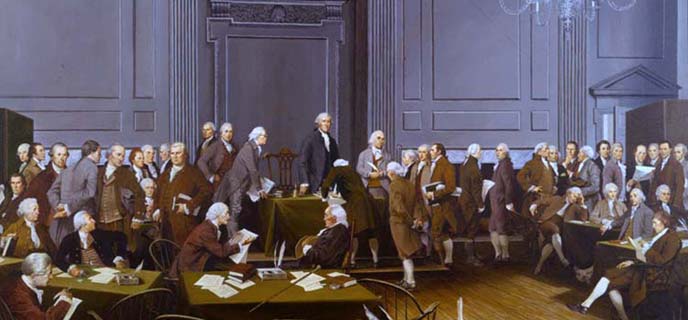The Electoral College as a “Problem Half-Solved”
With another Presidential coming up, it’s time for a topic I’ve addressed on this site since 2006: how the Electoral College can interfere with the consent of the governed, and how claims for its benefits fall apart on examination.
This time I’m quoting from Jonathan Wilson’s essay “The Electoral Punt” at Contingent Magazine:
In fact, the Framers’ own choices in the early republic show how thin those claims are. If, for instance, the Framers supposedly didn’t want to leave the Presidency in the hands of the largest states, why were all the Presidents elected in the first twenty years of the republic from Virginia and Massachusetts, the two largest states? (In the 1810 census, New York and Pennsylvania overtook them in population. By then, the Twelfth Amendment altered the Electoral College from its original design.)
Another modern claim is that the Framers wanted to give extra power to rural areas. But those men had no idea how the Industrial Revolution would change America. Rural areas overwhelmingly dominated their society. The most “urbanized” state, Rhode Island, had two “cities,” Newport and Providence, with less than 7,000 people apiece; more than 80% of the state population lived in farming communities.
This time I’m quoting from Jonathan Wilson’s essay “The Electoral Punt” at Contingent Magazine:
The truth is, the electoral college has never worked as intended by its creators. This is partly because they did not make clear what their intention was.The Framers, all elite politicians gathered in response to the Shays Rebellion and other popular unrest, didn’t want to leave the choice of President completely in the hands of the voters. They also didn’t want to make the President wholly dependent on the national legislature. And people in control of state governments still wanted sway in the new national system. The result was a process that gave all three sources of political authority a potential role.
For several humid summer months in 1787, the Constitutional Convention could not agree on a good way to choose a president. James Madison’s notes show they debated the issue off and on from June to September, going in circles until, near the convention’s end, they came up with a way to leave the problem half-solved.
Writing later, Alexander Hamilton—who originally wanted the president to serve for life like an elected king—published a rationale for this. In number 68 of The Federalist, Hamilton claimed the framers had come up with a clever way to balance different principles.Note that there’s nothing in Hamilton’s argument about reserving extra power for some states or some portions of the population, as some modern apologists for the Electoral College claim the Framers had in mind.
First, Hamilton wrote, “the people of America” obviously should get a direct say in choosing the president. But asking all the citizens across the nation to debate together would result in “tumult and disorder,” so the actual decision was entrusted to smaller groups of people elected by the people in each state. If no clear winner emerged from that group’s deliberation, then the House of Representatives would make sure the final choice had nationwide public support.
Many Americans have since treated Hamilton’s claim as a description of how the electoral college was originally intended to work. Yet notice that the electoral college has never—not once—worked that way. Even in the first presidential elections, contrary to Hamilton’s description (and what some framers apparently hoped), citizens in many states were excluded from participating.
In fact, the Framers’ own choices in the early republic show how thin those claims are. If, for instance, the Framers supposedly didn’t want to leave the Presidency in the hands of the largest states, why were all the Presidents elected in the first twenty years of the republic from Virginia and Massachusetts, the two largest states? (In the 1810 census, New York and Pennsylvania overtook them in population. By then, the Twelfth Amendment altered the Electoral College from its original design.)
Another modern claim is that the Framers wanted to give extra power to rural areas. But those men had no idea how the Industrial Revolution would change America. Rural areas overwhelmingly dominated their society. The most “urbanized” state, Rhode Island, had two “cities,” Newport and Providence, with less than 7,000 people apiece; more than 80% of the state population lived in farming communities.


2 comments:
This writer is always at his worst when he devolves into the modern, left-wing politics soupe du jour, and then strenuously attempts to relate it to the 18th century.
There’s no surprise this comment is anonymous—the writer must realize how embarrassing it is. This posting is all about analysis of the Framers’ thinking when they created what became known as the Electoral College. It doesn’t mention any “modern” candidates or events. The writer strains to dismiss the concern as “soupe du jour,” but anyone who’s followed this blog knows that I’ve written about problems and myths of the Electoral College since 2006 through every election cycle.
The commenter reveals her own political bias with the word “left-wing.” That strongly suggests that, along with most of today’s American right, she’s hoping for rescue from the Electoral College right now because she knows her candidate can’t win the consent of the governed.
In sum, this comment is a tiny temper tantrum from someone who can’t stand to see historical facts or political opinions she disagrees with, and she’s just smart enough to feel shame if anyone could attach her name to it.
Post a Comment